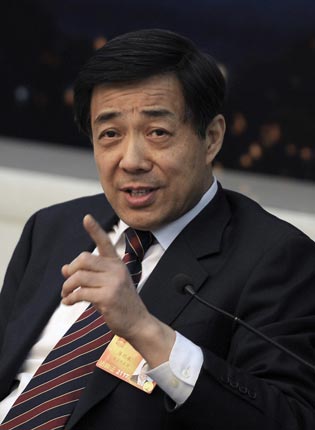Bo Xilai, China's most charismatic politician, makes a bid for power
Speculation mounts that China's Mr Cool may become a contender

The tall, dapper and smiling Chinese leader looked presidential as he pulled up at the front entrance of the Great Hall of the People, waving photographers and waiting reporters away. Senior members of the Politburo never enter through the front door. But this is Bo Xilai. And when the popular Bo, the mafia-busting Communist Party chief in the south-western city of Chongqing, arrives for the annual National People's Congress, there is a whiff of change. "He is very cool. He's Bo, no?" said one passer-by. At the vast People's Congress which opened in Beijing on Friday and continues until Sunday, Bo is enjoying a moment of celebrity.
It could be a sign that the "princelings" – the children of the 1949 Maoist revolutionaries – are gaining even more political traction in the Chinese power structure. It is an open secret that Mr Bo is seeking promotion to the powerful 9 member Politburo standing committee, the top rank of the leadership, and China watchers believe he is a serious contender.
At 60, Bo is comparatively young, and has done it all in China: he has been a big-city mayor, provincial governor and trade tsar. He is seen as a maverick but even more unusually for a leading Chinese politician, he oozes charisma and charm.
He is also Communist royalty: his father, Bo Yibo, was the last of a group of party leaders who consolidated their power in the 1980s and 1990s, oversaw the Tiananmen Square massacre, and are known as the "Eight Immortals".
The question of whether Bo will rise to the top of the Communist hierarchy is significant because the battle for these posts coincides with a moment when China's new-found international power is upsetting US and European leaders. There are growing concerns about the distorting effects of China's currency, while inside China, rampant corruption and the gap between rich and poor are fuelling protests.
When it came to trade tensions over European socks and Chinese-made bras, Mr Bo has already demonstrated his tough side, facing down the then EU Trade Commissioner, Peter Mandelson. Some say his media-conscious publicity-seeking side will work against him. But this is a man who is no stranger to adversity.
When he was 17, during the Cultural Revolution, he was imprisoned along with members of his family for five years, after which they were placed in a labour camp for another five years. During the Cultural Revolution, Bo's father was imprisoned and tortured for ten years; his mother was beaten to death.
Bo worked at the Hardware Repair Factory for the Beijing Second Light Industry Bureau before he was admitted to the Peking University Department of History, majoring in world history. He later graduated with a Bachelor of Arts degree. In 1982, he graduated from the Postgraduate Institute of the Chinese Academy of Social Sciences with a Masters.
His father was in charge of a Red Army unit called the "Shanxi Suicide Squad for the Liberation of China", which fought first against the Japanese and then against the Kuomintang in the Civil War, which led to the Revolution of 1949. His son, Bo Guagua, is at Oxford, his picture a fixture on Chinese celebrity websites as he squires willowy beauties to various balls.
Meanwhile, back home Mr Bo likes to present himself as a champion of the ordinary man and a very modern Maoist. In Dalian – the Garden City – one of China's prettiest and most financially successful cities, statuesque women astride horses patrol the city's precincts. Bo Xilai, according to local legend, used the tallest people to help rebrand one of China's burgeoning cities when he was Dalian's mayor.
Last year he also became China's best-known "red texter", sending out 13 million text messages to mobile-phone users bearing quotes from Chairman Mao including: "What really counts in the world is conscientiousness". Recipients relayed the messages 16 million times.
Join our commenting forum
Join thought-provoking conversations, follow other Independent readers and see their replies
Comments
Bookmark popover
Removed from bookmarks